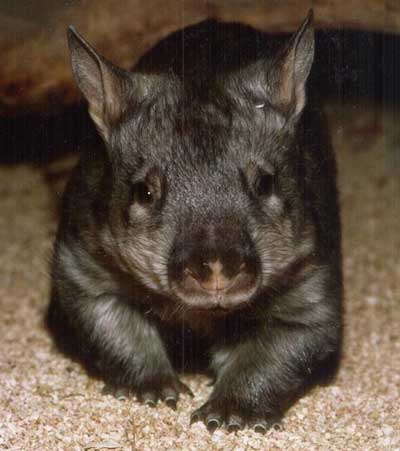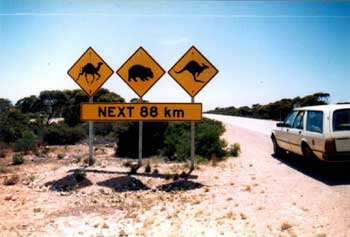 Accommodation | International
Flights | Domestic
Flights | Tours
| Travel
Insurance | Car
Hire | Visas
| Shopping
| Dating
| Humour
Accommodation | International
Flights | Domestic
Flights | Tours
| Travel
Insurance | Car
Hire | Visas
| Shopping
| Dating
| HumourWombat
The wombat is an Australian marsupial animal, short-legged and
muscular, up to about one metre in length with a very short tail,
resembling a bear or furry pig. They dig hollows to live in and
are found in forested, mountainous, and heathland areas of southern
Australia and Tasmania.
There are three species of wombat: the Common Wombat, the Southern
Hairy-nosed Wombat, and the
Northern Hairy-nosed Wombat. Their fur colour can vary from a sandy
colour to brown, or from grey to black. All three species measure
around a metre in length and weigh between 20 and 35 kg and are
herbivores, their diet consisting mostly of grasses, plants, bark
and roots.
The name wombat originates from the Eora Aboriginal community who
were the original inhabitants of the Sydney area.

Thanks to Camille Espzel for this wombat picture
The wombat is also known in an Australian joke as the animal to most closely resemble the Australian man; because he eats, roots(,) and leaves, but this image has since changed when the director of Nocturnal Wildlife Research Ltd, biologist Clive Marks, filmed for the first time ever a wombat courtship and mating in captivity in Australia, at Tonimbuk Farm in south-eastern Victoria.
With this first ever wombat porn movie the wombats shook off their
image as slow sloth like animals, the mating ritual involved lots
of running around chasing in figure eights, a few bites on the rump,
wild backward kicks, grunting and lots of heavy breathing. After
a prolonged period of copulation in the same position, the female
will break away and run in a pattern of circles and figures of eight
with the male close behind her. As soon as he bites her on the rump
she stops just long enough to permit him to roll her on her side
and begin copulating again.
Space appears to be the key to succes here, without enough space
in their pens to run the circles wombats will not mate in captivity.
Female wombats give birth to a single young in the spring, after
a gestation period of around 21 days.
They have a well developed pouch, which the young leave after about
6-7 months. Wombats are weaned after 15 months, and become sexually
mature at 18 months of age.
Their enemies are cars (see below) , Tasmanian devils and dingoes.

Photo by Rob Lapaer of Rainforest
Hideaway B&B, Cape Tribulation, N.Qld.
Warning sign for wombats on the Nullarbor plains
With their rodent-like front teeth and powerful claws
they dig extensive burrows and tunnels. They are usually nocturnal
but may sometimes venture out to feed on cool or overcast days.
They are not often seen but leave evidence in the form of damaged
fences and diggings.
Wombats have a very slow metabolism, taking around 2 weeks to complete
digestion, this helps their survival in arid conditions. They usually
are slow movers, but when threatened they can reach speeds of up
to 40 km/h and maintain that speed for up to 90 seconds, they defend
their home territory and react aggressively to intruders, other
animals that follow them into their burrow can be crushed against
the tunnel roof and sufocated. The territory of the Common Wombat
can be over 20 hectares, the hairy-nosed species have much smaller
territories of only about 4 hectares.
The ancestors of modern wombats evolved sometime between 55 and
26 million years ago, about 11 species flourished well into the
ice ages, some of them as large as rhinoceros who were still around
when Aborigines arrived in Australia, but hunting, and habitat alteration
brought about their extinction.
Wombats are quite popular in zoos and wildlife parks where they have been tamed and can be patted and held, though they can still be unpredictable if provoked, or if they are simply in a bad mood. Due to their weight a charging wombat at speed can easily knock an average-sized man over, and their sharp teeth and powerful jaws can inflict serious injuries. There are several reports of people having been bitten or scratched by wombats.
Feel free to add something to our wombat page !
HOME PAGE
Tourist Information
General Information
And Entertainment
ACCOMMODATION IN AUSTRALIA
Bed
& Breakfast
Budget
Accommodation
Backpackers Hostels
Hotels
in Australia
CAR HIRE IN AUSTRALIA
Australia Rental Cars
And
Campervans

TOURS
IN AUSTRALIA
What To Do In Australia
On-line
Shopping
On-line
Dating
![]()
About
Australia
Visas For Australia
How
To Get To Australia
How To Get Around
Travel Insurance
Travel Guides
Working
In Australia
Australian
Posters
Survival
Tips
Weather,
When To Go

Use of
this website constitutes acceptance of the User Agreement for this website
Contact us |
Advertise on this site
| Link to this site |Add
your photos or stories to this site |
Webmasters | Affiliates
